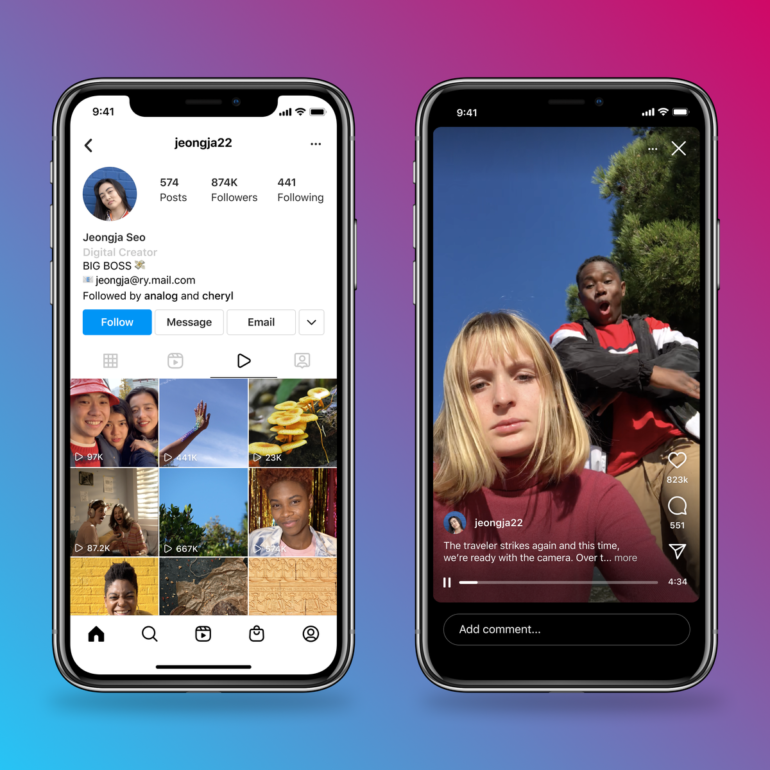Instagram is combining its long-form video platform IGTV and feed videos into one format into what the company is calling Instagram Video.
These videos will be accessible through a new Video tab on people’s profiles.
Each video can run up to 60 seconds long, a length that was only previously reserved for IGTV videos, unless the video is eligible for ads, in which case, Instagram said the preview will remain at 15 seconds.
“We love that our creator community has embraced video as a key format to tell their stories, entertain, and connect with their audiences, and that’s why we want to make it even simpler to create and discover videos on Instagram,” the Facebook-owned company said in a blog post.
Through the new Video tab, users will be able to tap anywhere on the video to enter full-screen viewing mode. They can also choose to keep scrolling to discover more video creators or tap the back button to exit.
Alongside the format shift, Instagram announced it is also introducing news features such as trimming, filters, and people and location tagging to videos.
The company added it is also merging feed post insights and video insights into a combined metric for businesses and creators.
Instagram introduced IGTV in June 2018 and made the platform a more direct competitor with other digital media giants like YouTube. It also gave Facebook a fresh channel for advertisers.
The refresh by the social media giant lands on the same day Facebook whistleblower Frances Haugen fronted the US Senate as part of its inquiry into Facebook’s operations, declaring the company as “morally bankrupt” and casting “the choices being made inside of Facebook” as “disastrous for our children, our privacy, and our democracy”.
Haugen, who used to work as the lead product manager for Facebook’s civic misinformation team, told the Senate that Facebook “intentionally hides vital information from the public, the US government, and governments around the world”.
The whistleblower also told the Senate members that Facebook “is choosing to grow at all costs” — which means that profits are being “bought with our safety.” This, in turn, is encouraging “more division, more harm, more lies, more threats, [and] more combat” online.
“No one truly understands the destructive choices made by Facebook, except for Facebook,” Haugen said.
When queried about its use of algorithms and engagement-based rankings to promote specific types of content that could be harmful, Haugen said that “Facebook knows that its amplification algorithms can lead children from innocuous topics — such as healthy food recipes — to anorexia-promoting content over a short period of time.”
Haugen added that Facebook CEO Mark Zuckerberg “has built an organisation that is very metrics-driven — the metrics make the decision,” and, therefore, “the buck stops with him.”
The allegations stem from The Facebook Files, a series of investigations posted by The Wall Street Journal. The articles are based on internal files, draft presentations, research, and internal staff communication leaked by the whistleblower.
The Wall Street Journal published six of the internal documents which were the basis of its investigation. Facebook then published two of them, complete with annotations last week.
Facebook announced last week it was hitting pause on plans to develop a version of Instagram for kids, citing the need for more time to work more closely with “parents, experts, policymakers and regulators.”
Haugen suggested the platform could be rolled out in a year, commenting: “Facebook understands that if they want to continue to grow, they have to find new users. The way they’ll do that is to ensure kids establish habits before self-regulation.”
In response to Haugen’s claims, Facebook issued a public statement, saying that former product manager “worked for the company for less than two years, had no direct reports, never attended a decision-point meeting with C-level executives — and testified more than six times to not working on the subject matter in question”.
On Monday, the social media giant suffered a global outage, which took its services — Facebook, Whatsapp, and Instagram – offline for six hours. Facebook blamed the issue on faulty BGP configuration changes.
“We want to make clear at this time we believe the root cause of this outage was a faulty configuration change,” the firm said. “We also have no evidence that user data was compromised as a result of this downtime.”



